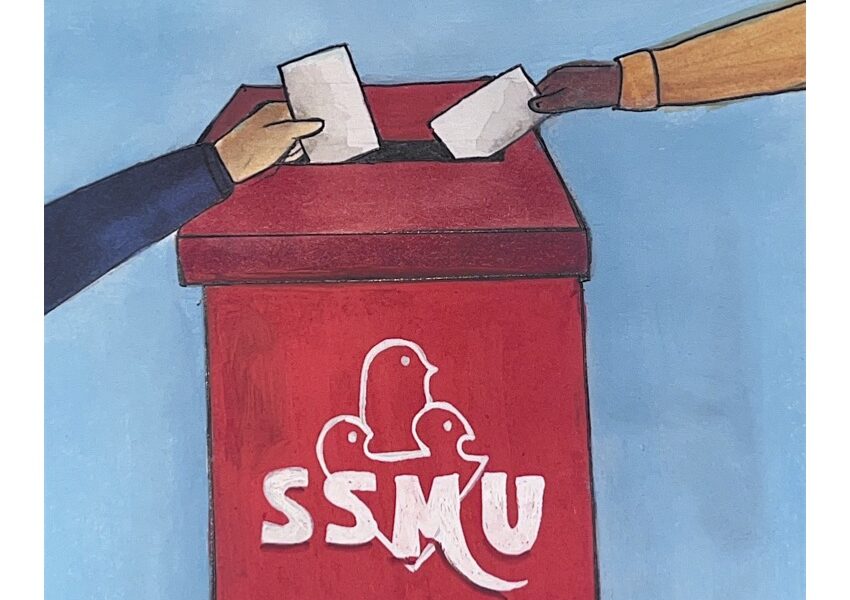The results of the Students’ Society of McGill University’s (SSMU) Winter referendum and executive elections were finalized on March 17. Alexandre Ashkir clinched the SSMU presidency and all but two referendum questions passed.
Of the 23,550 undergraduate students eligible to vote in the referendum, 3,944 cast their ballots. Students voted on 20 referendum questions, some of which had multiple parts, and for seven executive positions. The referendum questions concerned the fee renewals and increases for clubs and services.
Student Support—which offers Grammarly, Calm, and Udemy to students—was up for a fee renewal and increase following its pilot program this year. The question passed with 68 per cent voting “yes”, meaning that the service will remain available until it is up for renewal in 2024. Fee increases for the Muslim Students’ Association (MSA), the Referral Services fee, the Mental Health fee, and Safety Services, which encompasses MSERT, WALKSAFE, and DriveSafe, all also passed.
The Midnight Kitchen Collective successfully passed two questions in the referendum, asking first for a fee renewal—meaning they will continue to receive their fee until 2028—as well as a fee increase from $3.35 to $8.00.
The Daily Publications Society (DPS), which provides funding for The McGill Daily and Le Délit, failed to pass a fee increase with 57.6 per cent of people voting “no”. The Société de Publication de la Tribune (SPT), which runs The McGill Tribune, also ran two questions in the referendum: Students voted yes to a fee renewal and no to a fee increase of $1.50.
Other questions that passed include the creation of fees for the Legal Essentials Plan Fee, the SSMU Grocery program, and the International Relations Students’ Association of McGill (IRSAM). Students also voted to renew the fees for the Arab Student Network (ASN), Plate Club, Student Space Fund, Black Students’ Network (BSN), Environment Fee, and ECOLE.
Aside from questions about club fees, the referendum results determined the new SSMU executive team for the 2023-2024 academic year. Newly-elected SSMU President, Alexandre Ashkir, who is currently Speaker of SSMU’s Legislative Council and Chair of the SSMU Board of Directors, told the Tribune that he is excited to step into his new role but acknowledged that his unopposed campaign reflects underlying issues.
“I’m happy that the students trusted in me and voted for me. I promise to do all I can to accomplish the platform I presented and to support the SSMU in providing the best possible services and representation to the student body,” Ashkir said. “I must also recognize that while they could’ve voted no, the lack of other presidential candidates made my election less than ideal in terms of democratic values, and I hope to rectify the situation that caused this by the time of the next elections.”
Lalia Katchelewa, vice-president (VP)-elect University Affairs, is also excited about her new responsibilities and hopes to build on the work done this year by her predecessor, Kerry Yang, especially on pressing issues such as food accessibility and menstrual health equity.
“My head is buzzing with a million ideas and plans for next year,” Katchelewa told the //Tribune// in a post-election interview. “I can’t wait to sit down with this year’s VP University Affairs and discuss, evaluate, and strategize for next year [….] I want students to feel safe on campus regardless of who they are and I want them to have access to basic necessities.”
The other executives elected are Alice Fang for VP Finance, Nadia Dakdouki for VP Student Life, Jon Barlas for VP Internal, Liam Gaither for VP External, and Hassanatou Koulibaly, who currently serves as VP Student Life, for VP Operations and Sustainability.
Each elected executive ran unopposed except for Barlas, who won his two-way race with 55.2 per cent of the vote. Barlas told the Tribune that while he looks forward to his tenure, the lack of candidates for all executive positions was disappointing.
“Winning feels good, but this year’s executive elections season was definitely a huge letdown,” Barlas said. “The lack of interest in running for a SSMU executive position might be due to a number of things, but whatever the reasons may be, the fact that six of the seven positions ran uncontested, including the president, marks a real dent in student democracy. I don’t think many students saw any reason to vote at all, given their lack of options.”










